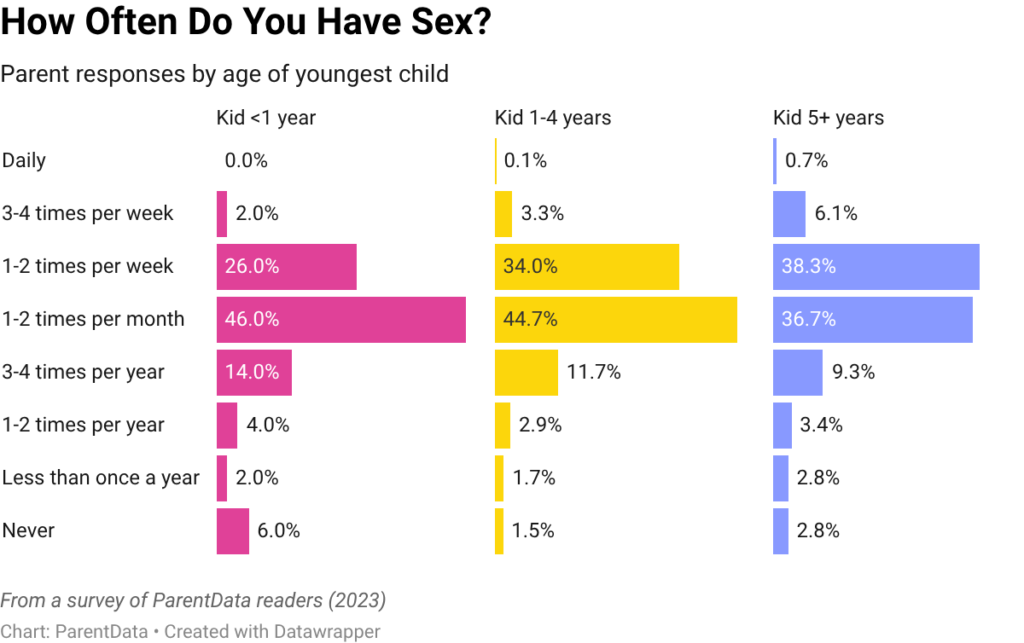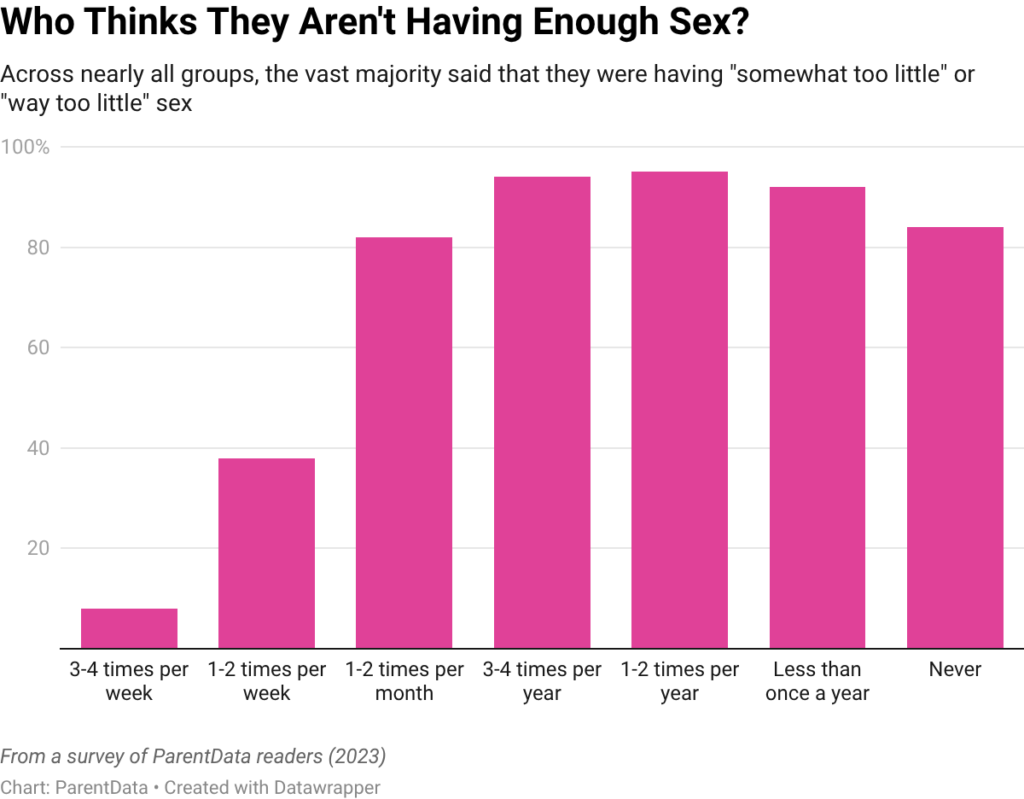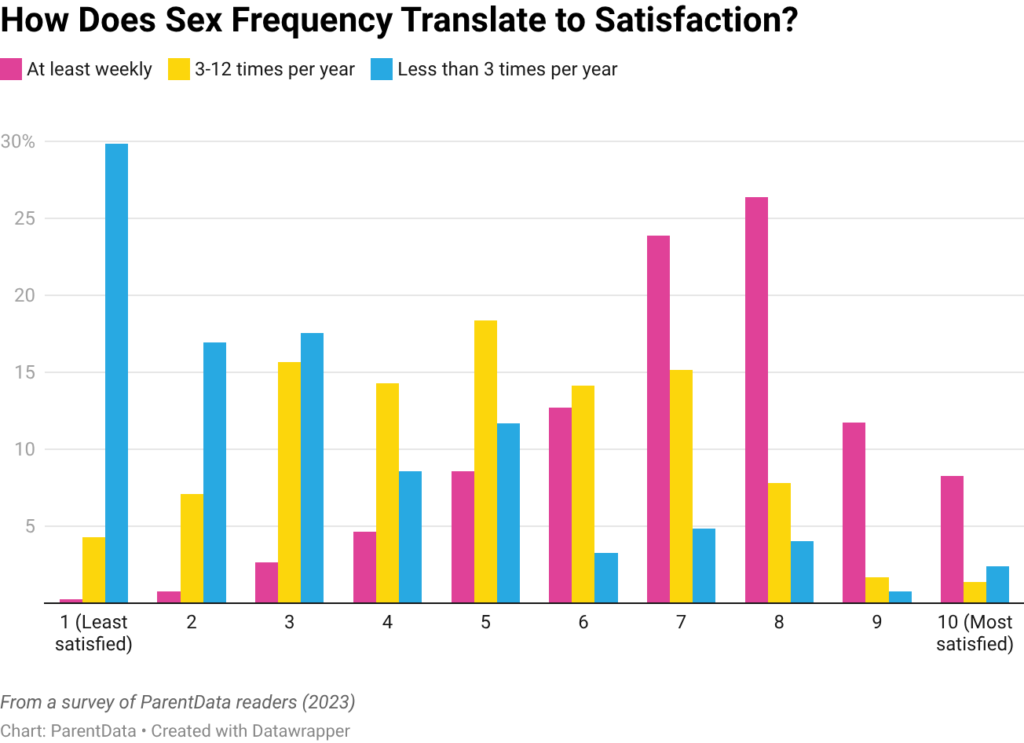Sex after kids can be such a fraught topic. You might feel like you’re not having enough or that you’ll never get back to your pre-kids rhythm. Or maybe you feel like you’re having plenty of sex, thankyouverymuch. Born out of this curiosity, in 2023, I asked you all to respond to a short survey on your post-having-children sex lives. We got more than 26,000 responses, which was pretty amazing. Thank you for sharing. Today, I’m reporting out. I’ll go through the data first and then have some resources at the end.
Before getting into it, though, I think it is important to talk about the value of surfacing data like this. One reason is to think about the range of the data. We often see discussions of averages: the average couple resumes sex six weeks after childbirth. That may be true, but seeing only that one number can trigger a feeling that one must do that or, in some way, be faulty. In these data, it is true that the average person reports resuming sex between six and 12 weeks, but there is a broad range — 30% saying between three and six months, 10% more than six months, and a sizable share saying they have not resumed sex.
A second reason to surface these data is to prompt discussion. A pretty large share of the people who responded here are not thrilled with their sex life. Some of this may be intractable, but I suspect there is room for improvement. We get into this more in the resources below, but the first step to making changes may simply be talking about it with your partner. If this piece, these data, are an opening, then excellent.
Having said all this, for some people, this isn’t going to be useful. Even when we see ranges, there are endpoints of the range, and if this is the group you’re in, it could make you feel worse rather than better, which is never my intention. So, be careful with yourself, and if this doesn’t feel like something you want to read now, skip it.
Now, to the data.

About the survey
We ran this survey in 2023. There were 26,136 respondents; they were recruited through ParentData newsletters, Instagram, and (thank you, Kevin) The New Fatherhood newsletter.
Most of the respondents identified as women (94%, with 5% men, and 0.3% identifying in another way). Eighty-three percent were in the age range from 30 to 39, and most had small children (93% with children under 5).
You were mostly married (96%) and mostly identified as heterosexual (95%). Finally, 44% were pregnant or breastfeeding.
How much sex are people having?
The first sex questions in the survey focused on how much sex people were having now. I went with categories: daily, three to four times a week, one to two times a week, etc., up to “never.” Getting precise data about this is a challenge. A few people pointed out that we didn’t exactly cover all the possible combinations — if you had sex an average of every other month, it wasn’t quite in a category — and that sex lives vary over time. But from these data, I’d argue we get a sense of what is going on.
The most popular responses were one to two times per week (30% of people) and one to two times per month (44.5% of people). But there was a wide range — 0.15% reported they have sex every day, and 3.5% of respondents said they never did.
There was very significant variation by child age. In the graph below, I show the distribution of sex frequency for people with children under 1, ages 1 through 4, and ages 5 and up. As children age, the frequency of their parents’ sex goes up (on average). For example, 6.8% of those with kids 5 and up have sex either daily or three to four times a week, versus only 2% of those with kids under 1. On the other side, those with older children are less likely to say they never have sex.

What else matters for sex frequency? What about things like parental age or sexual orientation?
To more easily summarize, I aggregated the data a bit. In particular, I divided people into two groups — those who had sex at least weekly (the first three groups in the graph above) and those who reported less than weekly. We can then ask: What makes people more likely to be in the “more frequent sex” group?
Some variation is unsurprising. Those who are married are about four percentage points more likely to have sex more frequently; those who are pregnant or breastfeeding are about seven points less likely.
Most interesting (and complicated) is parental age. On average, what we see in the data is that holding constant child age, older parents have less sex. On the other hand, holding constant parent age, people with older children have more sex. And since older people tend to have older children, these fight against each other in the data.
When we look overall across parental age, those under 30 are most likely to have weekly sex (50% of them do), followed by those 30-34 (37%). Among those over 35, about 30% report at least weekly sex (and there is not much variation across age among those over 35).
But this doesn’t necessarily mean you’ll have less sex as you age because your kids are aging, too. For example, in the data, those in the 35-39 range with kids over 5 are actually more likely to have weekly sex than those 30-34 with a child aged 2-4. The adult age decline is trumped by the child age increase.
Another way to see this is to think about a hypothetical (representative) couple who had a child at 33. Based on the data, they would have a 27% to 28% chance of having weekly sex in the first six months of their child’s life; this would rise to 33% in months seven to 12. They would then stay at this rate until the child was 2. But then we would predict the frequency to rise to about 43% when a child was over 5.
Unsurprisingly, more or less everyone says they had more sex before kids. About 50% say it was a little more, and 38% say it was a lot more. Only 2.4% of people said they had less sex before children.
Are you satisfied with your sex life?
The second set of questions I asked was about satisfaction, both whether people thought they were having enough sex and their satisfaction with their sex life on a scale of one to 10.
First answer: No, most people do not think they are having enough sex.
Below is a graph, by sex frequency, of the share of respondents who say that they are having either “somewhat too little” or “way too little” sex. These figures hover around 85% to 90% for all groups with a frequency lower than weekly.

The one strong predictor of satisfaction with the amount of sex is gender. Men are about 16 percentage points more likely to say they feel there is too little sex, again, holding constant the amount of sex. Interestingly, this difference is largest in the people having sex one to two times a week. In that group, 64% of men and 36% of women say it’s too little. In contrast, among those having sex one to two times per month, 82% of women and 93% of men say it’s too little: still a difference, but smaller. The only place we see no difference is in the tiny share of people who are having sex daily. Everyone thinks that’s enough.
Most other variables in the data do not correlate strongly with this share, conditional on frequency. Older people are slightly less likely to say they have too little sex; child age doesn’t matter much, nor does marital status or sexual orientation.
What about satisfaction? I asked people a pretty open-ended question: On the whole, how satisfied are you with your current sex life? The scale was 1 to 10.
The average person in the survey gave their sex life a 5.5. Perhaps unsurprisingly, satisfaction and sex amount were related. The graph below divides people into three groups based on their sex frequency and shows the distribution of satisfaction. We can see that the people with more frequent sex are most likely to report high satisfaction, in the seven to nine range. Those who have less frequent sex are more likely to report the lowest satisfaction numbers.
Satisfaction is, however, more complex than frequency. It’s also related to whether you think you are having enough sex. But both matter independently: even among people who say their amount is about right, there is still a gradient where more sex is associated with more satisfaction.

It’s unclear in all of this which direction the causality goes — do you have sex more because you like it, or is the quantity what delivers the satisfaction?
And beyond that, satisfaction with sex is a rich tapestry. I loved all your comments, but one that stuck with me was from someone who said she felt she had “somewhat too little” sex but gave her sex life a 10 on satisfaction. She said:
“When I say that the frequency of sex is “somewhat too little,” I mostly mean that the time we have for sex is too little — the frequency is about right, but it’s often a quickie in the shower or before kids wake up. I say I am “completely satisfied” with the current situation because we know it is not forever; we hope to be married a long time, and in the course of a long marriage, 10-ish years when we mostly have good-but-quick sex is not much to complain about! But I do look forward to a point in the future when we can have occasional sexual encounters over a period of hours rather than minutes, like we did before kids (massage, make out, sex, nap, snack, more sex, etc.). But I don’t have “hours” for anything leisurely in my life right now, and that is okay! Kids teach us that nothing is forever and that life has seasons. This season is full of a lot of joy, caregiving, and baby snuggles, and less full of adult snuggles, and my husband and I are satisfied with that.”
Okay, but how are you feeling about it?
There were thousands of comments.
A lot of readers were tired, a little sad, and frustrated.
“I want to want to have sex. I love my partner and want to want him the way I did when we were younger, but I’m just so tired.”
“It’s not that the sex is bad or that I don’t love my spouse as much … it’s that we’re both just so tired all the time that the sex is very … bland?… and feels like something we do quickly just for basic maintenance while the kids are temporarily asleep. The best analogy I can think of is forcing yourself to eat because you know you should, even though you’re not actually very hungry.”
Many discussed pain during sex.
“Would love to have sex more again, but it’s extremely painful, and I’m exhausted. I hate feeling like I’m letting my husband down by not investing in that part of our life right now, but I feel like my body 100% revolves around feeding my baby, and it’s hard to make an effort to have sex more often when I know it’s so painful every time now.”
“When will sex feel good again? (Baby is 4.5 months, and it’s still painful down there.)”
Some acknowledged a new reality, but without unhappiness.
“Had sex once during pregnancy, I think second trimester, and still have not thought about it post-child, but both my husband and I are fine with it! Honestly, not sure when we’ll start again; in this brave new baby-filled world, I can picture about a week into the future and never much further than that.”
There were some solutions-based comments.
“Recently, we’ve decided to try to have sex every day as our default. We don’t actually do so, but expecting that we will/might means we have a lot more sex, which we’re both happy about.”
“We’re both so tired, but when we do it, we’re always like — man, that’s great! We should do that more! We were morning-sex people, and that’s truly impossible with a toddler, so now we’re sex-during-weekend-naptime people.”
And then there was some hope, especially from people a little further out from delivery.
“I was so nervous that it would be different after the baby — my body was/is so different — that it was a year before we finally had sex. But it isn’t! Over 15 years, our sex life has ebbed and flowed, and we are in a great place 1.5 years after baby — maybe one of the best.”
Closing thoughts (plus some resources!)
After I put out the survey, someone wrote to me to say that after she and her partner did the survey, they got to talking about it, and then that day, they had sex twice.
Now, I am not necessarily guaranteeing that kind of result. But I wonder if this is an opportunity for conversation. So many of the comments I read, and so much of what I see in these data, is that people of all genders would like to have sex more regularly. Getting there is hard, but I think it might be possible (at least sometimes). Maybe talking about the data could help.
And if you need a little more help — if graphs and charts do not quite do it — I reached out to Dr. Sara Reardon (a.k.a. the Vagina Whisperer on Instagram) for some resources. She is a board-certified pelvic floor physical therapist, author of the book Floored, and founder of the V-Hive, an online pelvic floor workout platform. Here’s what she suggested:
- Painful sex after birth. Most postpartum moms do experience some discomfort the first time they return to sex after childbirth. There are several reasons this may occur.
- Returning to sex after having babies. If you are experiencing discomfort or pain with intercourse, although this may be common, it is not “normal,” and there are absolutely things to help.
- How to choose the right lube. Lubricants can be a great addition to sex for pleasure and can aid in vaginal dryness. But how do you know which lubes are smart choices and which ones you should stay away from?
The bottom line
- In general, people with kids have less sex than they did before they had kids.
- Sex frequency drops with young kids, then recovers. The survey data shows that parents of young children — especially under age 1 — tend to have less sex. But as kids get older, frequency increases.
- People who have sex more often tend to rate their satisfaction higher, but that’s not the whole story. Even at similar frequencies, men are more likely than women to say it’s not enough. And many people report that they are satisfied with less, especially when they view this as a phase.
- Discomfort and pain during sex are unfortunately common; however, it’s something you can address with support from a pelvic floor therapist.




















Log in